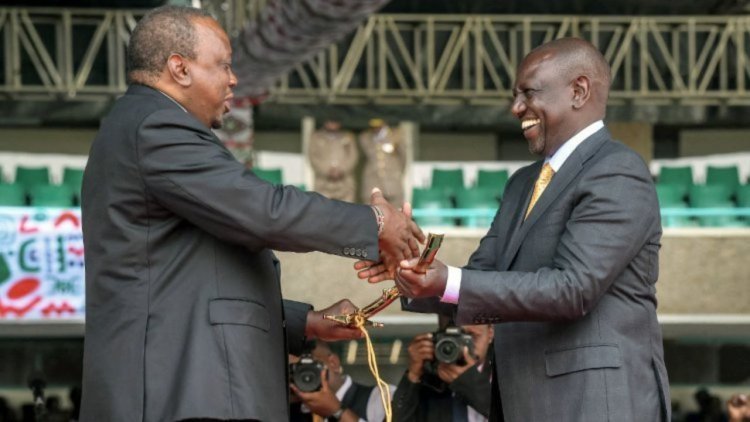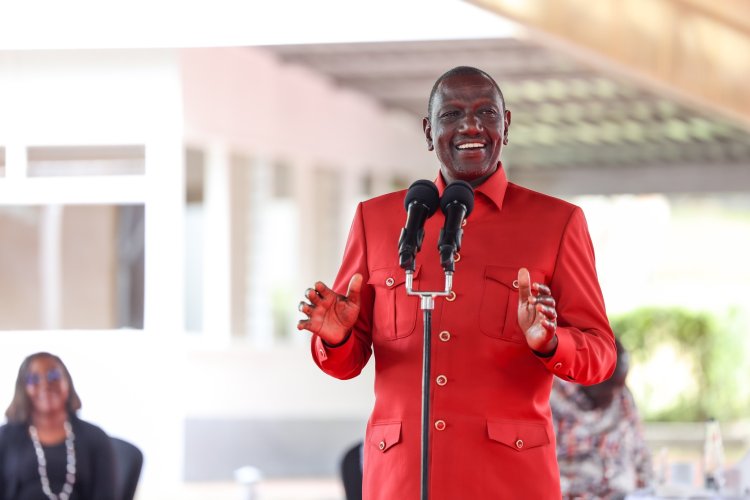How Uhuru Ruined Kenya's Economy From Kibaki Regime- Ruto
The President revealed how the late former President Mwai Kibaki had ensured consistency in the GDP ratio, indicating that it had at no point gone below 20 per cent.

President William Ruto on Sunday, January 14 insisted that his predecessor, Uhuru Kenyatta, was to blame for the torrid economic challenges that Kenya was currently facing.
The Head of State picked an online fight with the country's fourth president on X, claiming that his taxation policy had led to the emptying of public coffers, citing the reduction of the taxes to Gross Domestic Product (GDP) ratio from 20.1 per cent to 14 per cent.
Comparatively, the President revealed how the late former President Mwai Kibaki had ensured consistency in the GDP ratio, indicating that it had at no point gone below 20 per cent.
The least was pegged at 22 per cent while the most was at 23.9 per cent, all achieved during his second term between 2007 and 2013, the highest and lowest GDP attained during the first two years of the second term.

President William Ruto speaking during a meeting with Jubilee leaders at State House Nakuru on January 11, 2023. /PCS
However, in comparison, Uhuru began his first term with a GDP of 20.1 per cent, only to lower it in an almost consistent fashion to a low of 14 per cent in 2020 over the 10 years he was in office.
In 2017, the tax to GDP was at 16.8 per cent but had climbed to 17.6 per cent at the end of 2019 before it sunk to astonishing lows of 14 per cent in 2020.
"This is where the problem lies," Ruto fired.
Data from the Central Bank indicates that in the 2019/2020 Financial Year, Kenya's real GDP stood at Ksh8.7 trillion compared to Ksh6.6 trillion in 2013. In 2007, the real GDP stood at Ksh1.3 trillion.
Ruto and his cronies have consistently accused the former regime of ruining the economy through relentless procuring of debts, leading to Kenyans paying for it as a result through a series of taxes.
Notably, David Ndii, the Chairperson of President Ruto's Council of Economic Advisors (CEA), accused former President Uhuru of creating an economic legacy filled with debts procured at the expense of producers to satisfy the elite in social class, a matter he attributed to Kenya's worsening economic woes.
Confessing that the economy would contract rather than expand in the current administration, Ndii pointed out that a lot of Kenyan businesses catering to the wealthy class would have to change tact and focus on production, which guarantees profits.
"Uhuru’s economic legacy is fake debt financed prosperity which benefited urban rentier elites, at the expense of producers, reflected in consumerism similar to resource windfalls economists call “Dutch Disease”. There was no other way this was going to end but in tears.
"This economy is going to shrink. The other day someone who deals in high-end cars asked me when I think the economy would turn around. I gave him my honest opinion and told him his line of business was unlikely to recover and he might want to look into a production-oriented sector," Ndii gave his example of a car dealer who transitioned into farming through a detailed statement on X.
President Ruto on Thursday, January 11 termed Kenya's issues with debts as the greatest challenge he has had since assuming office on September 13, 2022.







